
Design and Build
The Siemens SX66 is a classic representation of early smartphone design, embodying both functionality and a bold, industrial look. Measuring 125 x 71 x 18 mm and weighing 210 grams, it is relatively hefty by modern standards, yet it reflects a robust build quality. The use of a Mini-SIM card and a full QWERTY keyboard indicates its focus on business and productivity, providing users with a tactile typing experience ideal for emails and notes.
Display
The device comes with a 3.5-inch TFT resistive touchscreen, capable of displaying 65K colors. Its screen resolution of 240 x 320 pixels offers a 4:3 aspect ratio, with a pixel density of around 114 ppi. While the screen might not stand up to today’s high-definition displays, during its time, it provided adequate clarity for reading emails, web browsing, and navigating the Windows Mobile interface.
Platform and Performance
Powered by Microsoft Windows Mobile 2003 SE PocketPC, the Siemens SX66 runs on an Intel Xscale PXA272 processor clocked at 520 MHz. This platform was at the forefront of mobile technology in the mid-2000s, combining the familiarity of Windows with the portability of a handheld device. The device comes equipped with 128MB of RAM, which was sufficient for basic multitasking and running classic productivity applications native to Windows PocketPC.
Memory and Storage
The SX66 offers 128MB of RAM and includes an SDIO/MMC card slot for memory expansion. This feature was crucial at a time when internal storage was limited, allowing users to store additional data, applications, and media. The external storage capability aligns with its purpose as a business device, catering to professionals who required more storage capacity for documents and enterprise applications.
Connectivity
Connectivity options for the Siemens SX66 are relatively comprehensive, given its era. It supports GSM networks across 850, 900, 1800, and 1900 MHz bands, ensuring broad worldwide compatibility. For data, it offers GPRS Class 10, but lacks EDGE support. Notably, the device includes Wi-Fi 802.11b, Bluetooth, and an infrared port, making it versatile for wireless connectivity and peripheral pairing. However, it does not include GPS positioning or a standard 3.5mm headphone jack, highlighting some of the limitations in connectivity features.
Audio and Sound
The device includes a loudspeaker and supports a variety of alert types, including vibration, as well as polyphonic and MP3 ringtones. While there is no 3.5mm audio jack, users can utilize wired and wireless options for audio playback, accommodating the era's multimedia needs adequately.
Battery Life
Equipped with a removable Li-Ion battery, the Siemens SX66 offers a standby time of up to 200 hours and talk time of up to 4 hours. This battery life was quite standard for smartphones in the mid-2000s, emphasizing the balance between performance and power consumption. The ability to replace the battery also extended the device's usability, offering users the opportunity to carry spare batteries for prolonged use.
Additional Features
Although lacking a built-in camera, the Siemens SX66's focus remains firmly on productivity. Its feature set includes an HTML browser, enabled by Pocket Internet Explorer, making it suitable for basic web browsing despite the limitations of mobile internet speeds of the time. Its silver casing offers a professional and sleek appearance, aligning with its business-oriented design ethos without unnecessary frills.
Conclusion
The Siemens SX66 stands as a testament to the early stages of smartphone evolution, prioritizing productivity and connectivity over entertainment features. Its design philosophy and technological capabilities made it an appealing choice for business professionals in the mid-2000s, providing a reliable, versatile tool for communication and personal organization. Despite its limitations by modern standards, it paved the way for the sophisticated smartphones we utilize today.
Key Features of Siemens SX66
- GSM technology supporting Quad-band (850/900/1800/1900).
- QWERTY keyboard for easy typing.
- 3.5-inch TFT resistive touchscreen with 65K colors.
- Powered by a 520 MHz Intel Xscale PXA272 CPU.
- Comes with 128MB of RAM and expandable memory with SDIO/MMC card slot.
- Connectivity options include Wi-Fi 802.11b, Bluetooth, and Infrared port.
- Runs on Microsoft Windows Mobile 2003 SE PocketPC.
- Offers loudspeaker functionality and supports MP3 ringtones.
- Removable Li-Ion battery providing up to 200 hours of standby time.
Disadvantages of Siemens SX66
- No EDGE support for faster data connectivity.
- Heavier device at 210g, which may be inconvenient for carrying.
- Low screen-to-body ratio (~42.7%) leading to bulkier form factor.
- Low pixel density (~114 ppi), resulting in less sharp display.
- Limited internal memory of 128MB RAM.
- No built-in camera functionality.
- Absence of a 3.5mm headphone jack.
- No GPS/Positioning feature.
- Lacks built-in FM radio.
- Proprietary USB likely limits compatibility with other devices.

View Also
More Phones
All Rights Reserved +14266 Phones © Mobilawy 2025

























